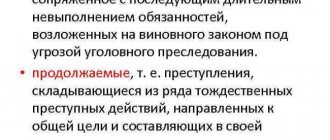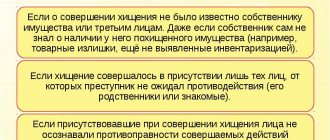RF Armed Forces: For a continuing offense you can be punished only once
The Supreme Court of the Russian Federation issued a ruling in case No. A05-14242/2015, in which the management company of an apartment building sought to cancel one of the fines of Rospotrebnadzor for shortchanging residents.
The management company, when determining the amount of heating fees for six months, allowed consumers to be shortchanged in several apartments. Based on this, Rospotrebnadzor adopted two resolutions to bring the company to administrative liability - one for the period from October to December 2014, the second for the period from January to April 2015. The Criminal Code challenged the legality of the second resolution to bring to administrative liability in court, considering that she was punished twice for the same act.
Guided by the provisions of the Rules for the provision of utility services to owners and users of premises in apartment buildings and residential buildings of the Code of Administrative Offenses of the Russian Federation, the courts of the first and appellate instances came to the conclusion that the offense committed by the management company is ongoing (single), as a result of which one of the decisions to attract administrative liability is illegal, since it holds the company accountable for the second time for the same violation.
Having disagreed with the decisions of the courts, Rospotrebnadzor appealed to the Supreme Court with a cassation appeal. The administrative body took the position that each sending by the management company to a specific consumer of a payment document containing an incorrectly determined amount of payment for heating constitutes a separate and independent offense.
Having considered the case, the Judicial Collegium for Economic Disputes of the Supreme Court of the Russian Federation concluded that the conclusions of the lower courts cannot be considered correct, but they did not become an obstacle to the issuance of lawful judicial acts. The panel considered that an offense expressed in the periodic sending of payment documents to consumers containing an incorrectly determined amount of payment for heating cannot be recognized as continuing. At the same time, the Court referred to the Resolution of the 23rd Plenum of the Supreme Court of the USSR of March 4, 1929 “On the conditions for the application of limitation and amnesty to ongoing and ongoing crimes,” which explained that crimes called ongoing are characterized by the continuous implementation of a certain criminal act . Very similar to continuing crimes are continuing crimes, i.e. crimes consisting of a number of identical criminal actions aimed at a common goal and in their totality constituting a single crime.
The judicial panel also referred to the ECHR Resolution of February 10, 2009 in the case “Sergey Zolotukhin v. Russian Federation”. It notes that Art. 4 of Protocol No. 7 to the Convention should be interpreted as prohibiting prosecution or trial for a second “offence” if they arise from identical facts or facts that are substantially the same.
However, despite this, the Supreme Court of the Russian Federation did not agree with the position of Rospotrebnadzor, pointing out that the administrative body did not provide convincing evidence that there was not one ongoing offense, but several separate and independent ones. Thus, the Judicial Collegium decided that the appealed judicial acts should be left unchanged.
“When considering the materials of the inspection and qualification of the actions of a legal entity, the administrative body should have taken into account that if the illegal actions committed to charge inflated amounts of fees for utility services are classified by the body as independent offenses that do not have the signs of a single ongoing offense, then in relation to Part 1 of Art. 4.4 of the Code of Administrative Offenses of the Russian Federation, a person is subject to prosecution for each month of calculation against the residents of the house,” stated Artem Smertin, lawyer of the Kirov Region Codex Agency.
The expert believes that the Supreme Court of the Russian Federation explained in its ruling that the totality of actions of the management company, expressed in the constant incorrect calculation of payments and, as a result, shortchange of consumers, was aimed at achieving one goal and was essentially identical, which constitutes a continuing offense, for which she could only be prosecuted once.
According to Dentons lawyer Viktor Tulsanov, the issue of continuing administrative offenses, in contrast to continuing crimes, has not yet been worked out in judicial practice. “Traditionally, a series of sequential actions of one subject, each of which individually can be qualified as an administrative offense, is assessed by the courts as a continuing offense, which is often incorrect, or as a combination of many independent offenses,” the expert explained.
Viktor Tulsanov believes that, having adopted a positive definition for the management company in the case under consideration, the Supreme Court actually avoided formulating legal criteria with the help of which the law enforcement officer could assess whether several homogeneous unlawful actions form a single corpus delicti of an administrative offense (continued offense) or whether repetition of the violation.
At the same time, the expert agreed with the position of the College regarding the impossibility of recognizing the periodic sending of payment documents with the incorrect amount of payment as a continuing offense. “In this case, the criterion of “continuous” failure to fulfill duties is not met, which is typical for a continuing administrative offense,” explained Viktor Tulsanov.
The expert also commented on the definition in the part where the Court did not support the administrative body’s arguments about the independent nature of the offenses: “This position of the Supreme Court raises several questions. Firstly, what kind of “convincing evidence” can we talk about if the factual side of the case (sending several receipts for heating with incorrect calculations) was established by the courts? Secondly, does the adopted definition mean that under certain conditions a number of sequential actions of one subject, each of which individually can be qualified as consumer deception (Part 1 of Article 14.7 of the Code of Administrative Offenses of the Russian Federation - measuring, weighing or counting), can constitute one continuing administrative offense? And if so, then the third question arises: what are the criteria for classifying a number of illegal actions as a continuing administrative offense?”
“It is obvious that the courts have yet to formulate answers to these questions in practice,” concluded Viktor Tulsanov.
Resolution of the Plenum of the Supreme Court on complicity in a crime
To date, only PPVS No. 12, adopted on June 10, 2010, is fully devoted to issues of complicity. It should be immediately noted that for the most part it is intended to clarify issues that arise during the qualification, investigation and resolution of crimes provided for in Art. 210 of the Criminal Code of the Russian Federation: organization of a criminal community (organization) and (or) participation in it (it).
Forms of complicity in a crime and types of accomplices Read more
The resolution in question provides a fundamental explanation of the identity of the concepts of “criminal community” and “criminal organization”. A lot of controversy was caused by the vague wording of the articles of the Criminal Code concerning such concepts as:
- stability of the criminal community;
- the presence of an internal structure;
- community organization itself, etc.
The Criminal Code of the Russian Federation does not define these categories, which caused difficulties in practice before the release of PPVS No. 12. Thanks to the very detailed explanations given by the Supreme Court, it became clear, in particular, that the internal structure of a community should be understood as a system of units or organized groups consisting of 2 or more members, united by a single leadership.
This is a continuing crime
Within the framework of the continental criminal law system, it is possible to trace general approaches to the definition of a continuing crime. Professor K. Roksin from Germany classifies as continuing acts in which the tort does not end with the implementation of the act, but the tort, which continues through the tortious will of the subject, continues for as long as the unlawful state created by it persists (Zustand) [4, p. 289]. Within the meaning of Article 56 of the Dutch Criminal Code, “continuous actions” exist where actions resulting from one decision of the offender are equated to actions of the same nature and must be assessed according to the same standard [10, p. 77–78]. These definitions indicate such a characteristic subjective sign of a continuing crime as the purpose of the criminal act of the subject.
Other decisions of the Supreme Court regarding complicity
Since a criminal organization (community) is only one of many forms of complicity, PPVS No. 12 was unable to resolve all the issues that arise in the qualification and resolution of group crimes. Other acts of the Supreme Court come to the rescue.
PPVS explaining the concept of collusion
To assess a crime as committed by a group of persons by prior conspiracy, one of the key values is the definition of the very concept of conspiracy. It can be found in paragraph 10 of the PPVS dated January 27, 1999 No. 1.
The resolution is devoted to issues of judicial practice under Art. 105 of the Criminal Code of the Russian Federation, but the definition of conspiracy given in it as an agreement on a crime reached in any form before its commission can be used when qualifying any acts provided for by the Special Part of the Criminal Code.
PPVS about complicity in crimes with a special subject
The answer to the question of whether complicity in crimes with a special subject is possible is given in PPVS dated 07/09/2013 No. 24. These clarifications, although they relate to issues of corruption crime, can be applied in other cases. In paragraph 15 of the resolution in question, a positive answer is given to the question about the possibility of this complicity, however, such accomplices, who are not special subjects, cannot act as a performer.
In other words, accomplices in crimes with a special subject can only be organizers, accomplices or instigators.
PPVS on complicity with persons under the age of criminal responsibility
At the moment, the PPVS dated February 14, 2000 No. 7 has lost force, but the explanations expressed in it partially seem relevant. Thus, paragraph 9 of the act in question states that the use for criminal purposes of a person who, due to age, is not capable of being the subject of a crime, does not give rise to complicity.
This idea was continued and reflected in the PPVS dated 01.02.2011 No. 1, clarifying that in the case of involving a minor who is not subject to criminal liability in criminal activity, the adult involved is not only subject to liability under Art. 150 of the Criminal Code of the Russian Federation, but also acts as a perpetrator in an act committed by such a minor.
This list cannot be called exhaustive, but we can conclude that the answers given to questions about complicity in various crimes can be applied by analogy to other crimes, if this does not contradict the norms of current legislation.
What is a continuing crime
A continuing crime is an act or omission associated with a prolonged failure to fulfill the duties assigned to each guilty citizen by law. The main sign of a continuing violation is a continuous time interval within which the offender systematically carried out various illegal actions. The law knows cases of continued criminal inaction, therefore failure to fulfill certain obligations also serves as a denial of the law.
The time period for a continuing crime can be of different lengths. It ends after the person turns himself in, he is detained by law enforcement officers, or the statute of limitations for the violation expires. To be held accountable for a continuing crime, it is not necessary that the illegal acts be completed by the offender. The statute of limitations for continuing crimes is 15 years.
This type of complex disorder has a specific subjective side. The intent of the offender can only be direct, because illegal actions committed over a long period of time already speak of a crime. The concept of a continuing crime can be applied to violations described not only by the Criminal, but also by the Administrative and Civil Codes.
The most striking examples of ongoing violations are failure to pay alimony, possession of drugs or weapons, and evasion of military service. All these crimes are characterized by duration, because they occur at one specific moment and then continue continuously.
The concept of a continuing crime can be considered using the example of Article 151 of the Criminal Code - sale of alcohol to minors. If a seller in a store sells strong drinks to teenagers, this is an administrative offense, but if there are three repetitions, the seller will be prosecuted in criminal proceedings.
ONGOING CRIME
a crime that is carried out continuously over a certain period of time. The crime is limited in time by the initial and final moments of its commission; the end point mostly coincides with the achievement of a certain result. So, for example, theft is considered completed at the moment of taking possession of someone else’s property. But criminal law knows some crimes that are continuously committed for a more or less long time. Examples of criminal offenses are: desertion (see), assignment of the rank of an official and other crimes. Desertion begins at the moment when a serviceman deserts from a unit, and misappropriation of rank begins when the culprit illegally appropriated a rank to himself. However, the crime in both cases does not stop at this moment, but continues in the subsequent period, ending when the subject himself stops his criminal activity or is detained by the authorities. D. p. should not be confused with a continuing crime









